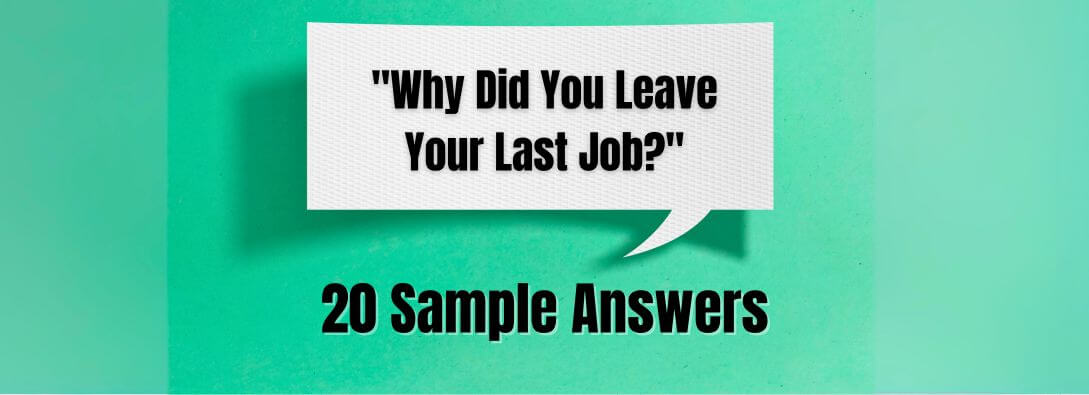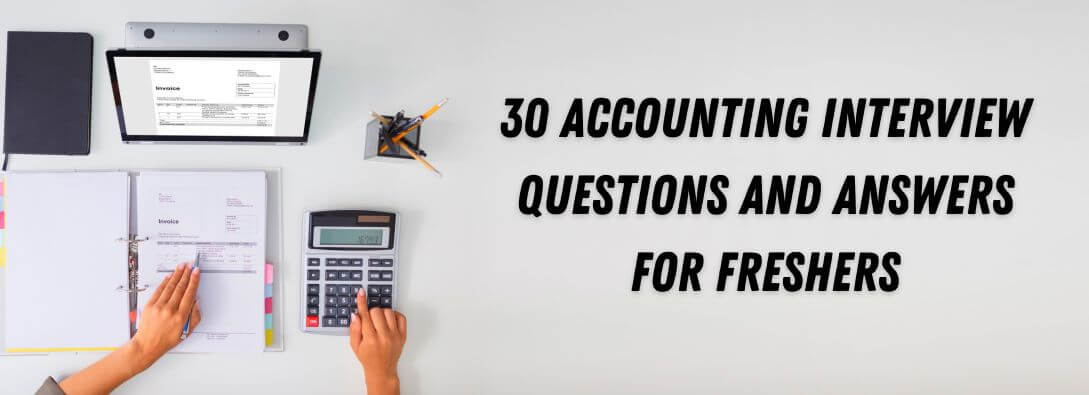
"Why Did You Leave Your Last Job?" 20 Sample Answers
"Why did you leave your last job?" is a staple in almost every job interview. It's a question that gives interviewers valuable insights into your career trajectory, motivations, and potential fit within the company. By understanding why you left your previous role, hiring managers can assess your loyalty, honesty, and overall professional outlook.
Your response to this question is crucial as it can significantly impact the interviewer's perception of you as a candidate. A well-crafted answer can demonstrate your career aspirations, problem-solving abilities, and positive attitude. To help you answer this HR interview question, here is an extensive guide.
Why did you leave your last job? Sample Answers
1. Career growth:
"I left my previous position because I was seeking new challenges and opportunities for advancement. While I learned a great deal in my last role, I felt I had reached a ceiling in terms of growth potential. I'm looking for a position where I can continue to develop my skills and take on increased responsibilities."
2. Company restructuring:
"My previous company underwent a major reorganization, which resulted in the elimination of my position. While it was unfortunate, I understand that businesses sometimes need to make tough decisions. I'm now excited to bring my skills and experience to a new organization where I can contribute to its success."
3. Relocation:
"I recently relocated to this city for personal reasons. While I enjoyed my previous job, the move made it impossible to continue in that role. I'm now eager to establish myself professionally in this new location and contribute my skills to a local company."
4. Career pivot:
"After careful consideration, I decided to transition into a new industry that aligns more closely with my long-term career goals. While I valued my experience in my previous role, I'm excited about the challenges and opportunities this new direction offers. I believe my transferable skills will be a valuable asset in this transition."
5. Education:
"I decided to take some time off to pursue further education and enhance my professional qualifications. This decision was driven by my desire to stay current in my field and bring more value to my next role. Now that I've completed my studies, I'm eager to apply my new knowledge in a practical setting."
6. Work-life balance:
"I was seeking a position that offered a better work-life balance. While I was committed to my previous role, the demands of the job were affecting my personal life. I'm looking for an opportunity where I can continue to excel professionally while maintaining a healthy balance with my personal commitments."
7. End of contract:
"My previous position was a fixed-term contract that came to its natural conclusion. I enjoyed the project and learned a lot, but as the contract ended, I'm now seeking a new opportunity where I can apply the skills I've gained and continue to grow professionally."
8. Company culture:
"I realized that the culture at my previous company wasn't the best fit for me long-term. I'm seeking an environment that aligns more closely with my personal values and work style. I believe that finding the right cultural fit is crucial for both personal job satisfaction and professional success."
9. Skills utilization:
"In my previous role, I found that I wasn't fully utilizing the range of skills I possess. I'm looking for a position where I can leverage my entire skill set and continue to develop new competencies. I believe this will allow me to make a more significant contribution to my next employer."
10. Industry trends:
"The industry I was working in has been undergoing significant changes due to technological advancements. I decided to proactively seek a role that aligns with these emerging trends. I'm excited about the opportunity to work with cutting-edge technologies and stay at the forefront of industry developments."
11. Start-up to corporate:
"I've spent the last few years working in a start-up environment, which was an incredible learning experience. Now, I'm looking to transition to a larger corporation where I can apply the agility and innovation I've learned while also gaining experience with more structured processes and larger-scale operations."
12. Management changes:
"There was a significant change in upper management at my previous company, which led to a shift in the overall direction and priorities of the organization. While I respect the new direction, I felt it was a good time to explore opportunities that align more closely with my professional goals and values."
13. Commute:
"I was looking for an opportunity closer to home to reduce my daily commute. While I enjoyed my previous job, the long travel time was impacting my productivity and personal life. I'm seeking a role where I can contribute my skills and experience without the strain of a lengthy commute."
14. Professional network:
"Through my professional network, I became aware of an exciting opportunity that aligns perfectly with my career goals. While I wasn't actively looking to leave my previous job, this new role offered such a great fit for my skills and aspirations that I decided to pursue it."
15. Company stability:
"I had some concerns about the long-term stability of my previous employer due to challenges in the industry. I decided to be proactive in seeking a position with a company that has a strong market position and clear plans for future growth. I believe this will provide a more secure environment for my career development."
16. Entrepreneurial endeavors:
"I took some time away from traditional employment to pursue an entrepreneurial venture. This experience taught me a great deal about business operations and self-management. Now, I'm excited to bring these entrepreneurial skills and mindset back to a corporate setting where I can contribute to the company's innovation and growth."
17. Family responsibilities:
"I needed to take some time off to attend to important family matters. This was a necessary decision, and I'm grateful I was able to be there for my family during that time. Now that these matters are resolved, I'm eager to re-enter the workforce and refocus on my professional career."
18. Travel opportunities:
"My previous role required extensive travel, which was exciting for a while but became challenging to maintain long-term. I'm now seeking a position that allows me to have a more balanced lifestyle while still engaging in meaningful work. I believe this will enable me to be more productive and committed in my professional role."
19. Skill development:
"I left my previous job to focus on developing a new skill set that I believe is crucial for my long-term career goals. I've invested time in learning [specific skills], and now I'm eager to apply these new competencies in a professional setting. I'm excited about the added value I can bring to my next role with these enhanced skills."
20. Mission-driven work:
"I've been reflecting on my career path and realized that I want to work for an organization whose mission aligns more closely with my personal values. While I valued my experience at my previous company, I'm now seeking a role where I can contribute to work that I find deeply meaningful and impactful."
Why HR professionals ask the question "Why did you leave your last job?" and what they're looking to learn:
The question "Why did you leave your last job?" is a staple in many job interviews. While it may seem straightforward, it's a nuanced inquiry that HR professionals and hiring managers use to gain valuable insights about a candidate. Understanding the motivation behind this question can help job seekers provide more effective and strategic responses.
Key points on why HR asks this question and what they want to know:
1. Assessing your professional judgment and decision-making:
HR wants to understand how you approach important career decisions. They're looking for evidence of thoughtful consideration, strategic thinking, and professional maturity. Your answer can reveal whether you make impulsive choices or carefully weigh your options before making significant career moves.
2. Uncovering potential red flags:
Interviewers use this question to identify any concerning patterns or issues from your past employment. They're listening for signs of conflicts with management, inability to adapt to change, or a tendency to leave jobs quickly. How you frame your departure can provide clues about your work ethic, interpersonal skills, and overall reliability as an employee.
3. Gauging your fit for the current role and company culture:
Your reasons for leaving a previous job can indicate what you value in a workplace and what motivates you professionally. HR professionals use this information to assess how well you might fit into their organization's culture and the specific role you're applying for. They want to ensure that their company can provide what you're seeking to avoid a potential mismatch.
4. Understanding your career goals and ambitions:
Your response can offer insights into your long-term career objectives and how the current position fits into your professional journey. HR wants to know if you're likely to be satisfied and engaged in the role they're offering, or if you might soon be looking to move on. This helps them evaluate whether investing in you as an employee aligns with the company's needs and expectations.
By asking this question, HR professionals aim to build a comprehensive picture of you as a candidate, going beyond just your skills and experience to understand your motivations, values, and potential as a long-term employee.



